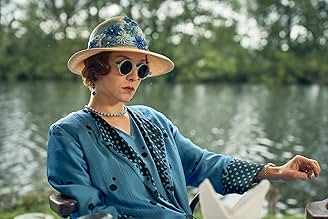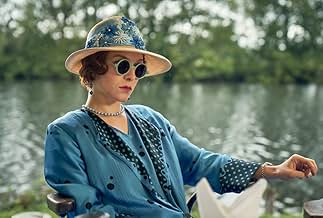IMDb-BEWERTUNG
6,1/10
5658
IHRE BEWERTUNG
Ein Dienstmädchen, das im England der Nachkriegszeit lebt, plant heimlich ein Treffen mit dem Mann, den sie liebt, bevor er abreist, um eine andere Frau zu heiraten.Ein Dienstmädchen, das im England der Nachkriegszeit lebt, plant heimlich ein Treffen mit dem Mann, den sie liebt, bevor er abreist, um eine andere Frau zu heiraten.Ein Dienstmädchen, das im England der Nachkriegszeit lebt, plant heimlich ein Treffen mit dem Mann, den sie liebt, bevor er abreist, um eine andere Frau zu heiraten.
- Auszeichnungen
- 2 Nominierungen insgesamt
Nathan Chester Reeve
- Dick
- (as Nathan Reeve)
Sope Dirisu
- Donald
- (as Sope Dìrísù)
Empfohlene Bewertungen
The title "Mothering Sunday" might suggest that this would be a good one to take your ol' mum to see as 'a nice treat'. Which indeed you might like to do, as long as you set the expectations first! For this is a beautifully crafted, if flawed, story of life after the First World War. A movie that has less focus on those killed in battle and more on those left behind.
Positives:
Negatives:
Summary Thoughts on "Mothering Sunday": It's the acting and the cinematography that sets this apart for me. Although it had its irritations, I found this to be a beautiful and engaging watch. The story is perhaps a tad predictable. But overall this is a nicely crafted and thought-provoking film that gets a thumbs up from me.
(For the full graphical review, check out #onemannsmovies online. Thanks.)
Positives:
- This movie looks stunning (cinematography by Jamie Ramsay), from the opening close-up shots of Odessa Young, through bucolic bike-riding in England's leafy lanes to the luscious love-making scenes. All perfectly staged and beautifully lit. You could take many of the stills from this movie and grace the walls of an art exhibition with them.
- Where has Odessa Young come from? The Sydney-born actress is just fabulous here, commanding a real presence for the camera. It's a brave performance too with sex and extensive full-frontal nudity. This includes a naked wander through the old house that might feel exploitative if the writer or director had been a man. (The ladies also get full-frontal views of Josh O'Connor which adds balance to the film. This is, frankly, so often lacking in films of this type).
- The rest of the acting from the ensemble cast is also top-notch. Colin Firth is just squirm-inducingly awful (in a great way) as Mr Niven, always tiptoeing around the tension in a very English way with platitudes about the weather. Olivia Colman is also magnificent: when is she not? I saw one user review on here saying that she "dialled in her performance" which I couldn't disagree with more. She's a living portrait of grief and anger. "You're so lucky", she says to Jane at one point, "to be so comprehensively bereaved at birth". The fact that she does virtually nothing with her face until a single dramatic explosion is the epitome of perfect acting, where 'less is more'.
- I liked the way that the film properly reflected the social damage of the war. We've been here before, with episodes of "Downton Abbey" for example, but the fact that this is set so many years after the conflict but that it was still so invasive gave me room for much thought.
- Complementing a strong female team behind the camera is composer Morgan Kibby with an interesting and engaging score.
Negatives:
- The events shown have a wraparound story showing Jane's later writing life, both in a mid-life relationship with philosopher Donald (Sope Dirisu) and her elderly life (where Jane is portrayed by Glenda Jackson). It is a genuine delight to see Ms Jackson on the screen again: astonishingly, according to IMDB, her last big-screen appearance was back in 1990! However, these structural elements of the story didn't work for me. Although I might be accused of 'not understanding what the writer was trying to do' (incorrect, I do), there is a case here, at least in the movie version, for a 'simple is good' approach. I think the underlying story set in 1924 was gripping and engaging enough not to require the complexity introduced by these later scenes. I'd have preferred a simpler 90-minute film focused on that story. (I've not read Graham Swift's book: perhaps this all works better as a novel?)
- Typecasting is a terrible thing, but Josh O'Connor has such a striking resemblance to Prince Charles that it's sometimes difficult not to think "Ooh, I've just seen the future king's bits"!
Summary Thoughts on "Mothering Sunday": It's the acting and the cinematography that sets this apart for me. Although it had its irritations, I found this to be a beautiful and engaging watch. The story is perhaps a tad predictable. But overall this is a nicely crafted and thought-provoking film that gets a thumbs up from me.
(For the full graphical review, check out #onemannsmovies online. Thanks.)
I wanted to like this film but it strikes me as an empty book, an idea abut time but with no place to go.
Main story set in 1924 sees the country gentry still reeling from the slaughter of World War I Several families maintain the tradition of a picnic by the river on Mother's Day and recall the times when the children played and swam in the river. They're all dead now except for the youngest (Josh O'Connor), who's about to marry one of the daughters who was engaged to one of the boys now dead.
A maid in the house named Jane (Odessa Young), an orphan who's been "in service" since she was 14, is having a secret affair with the boy and meets with him one last time before he goes to the party to announce his engagement to the young woman.
The lady of the house (Olivia Colman) tells the maid she's lucky to have been an orphan. She can observe life without having to deal with the deaths of loved ones.
Jane eventually leaves the house and goes to work in a bookstore where she meets a philosopher and becomes his lover (there's talk of marriage). We also see Jane as an old woman (Glenda Jackson) who has indeed lived most of her life as an observer and as a famous writer.
Jane's life after she leaves the country house is sketchy and the viewer will likely feel cheated. We're not told very much ... yet the film runs for 104 minutes.
Jane strikes me as a character out of time and place. Would an uneducated house maid in 1924 be this self- possessed and confidant? Were interracial marriages possible in England in the 1930s and 40s? What kinds of books did Jane write? No details.
Young is good and O'Connor is better. Colman and Jackson combined have about 10 minutes of screen time. Colin Firth plays the "lord of the manor," but no one else registers.
There's a reference to Virginia Woolf's "Orando" and I guess that's meant to be a clue. Jane is a character out of time. Time is fluid and has no temporal barriers.
Main story set in 1924 sees the country gentry still reeling from the slaughter of World War I Several families maintain the tradition of a picnic by the river on Mother's Day and recall the times when the children played and swam in the river. They're all dead now except for the youngest (Josh O'Connor), who's about to marry one of the daughters who was engaged to one of the boys now dead.
A maid in the house named Jane (Odessa Young), an orphan who's been "in service" since she was 14, is having a secret affair with the boy and meets with him one last time before he goes to the party to announce his engagement to the young woman.
The lady of the house (Olivia Colman) tells the maid she's lucky to have been an orphan. She can observe life without having to deal with the deaths of loved ones.
Jane eventually leaves the house and goes to work in a bookstore where she meets a philosopher and becomes his lover (there's talk of marriage). We also see Jane as an old woman (Glenda Jackson) who has indeed lived most of her life as an observer and as a famous writer.
Jane's life after she leaves the country house is sketchy and the viewer will likely feel cheated. We're not told very much ... yet the film runs for 104 minutes.
Jane strikes me as a character out of time and place. Would an uneducated house maid in 1924 be this self- possessed and confidant? Were interracial marriages possible in England in the 1930s and 40s? What kinds of books did Jane write? No details.
Young is good and O'Connor is better. Colman and Jackson combined have about 10 minutes of screen time. Colin Firth plays the "lord of the manor," but no one else registers.
There's a reference to Virginia Woolf's "Orando" and I guess that's meant to be a clue. Jane is a character out of time. Time is fluid and has no temporal barriers.
Mothering Sunday. A lot of work has gone into this film in terms of congregating a good cast including a Olivia Coleman & Colin Firth. Some good acting and lovely cinematography, but unfortunately it was very, very slow. Trying to create an enigmatic and sultry atmosphere for a romantic love story but it just didn't come off.
The penny dropped that all the good romantic films watched in the past you 'bought in' to the characters and felt for them, urging them to succeed. Here I found we got to a point after 30 minutes where we couldn't care less about the two lovers or what happened to them. We weren't moved or brought to tears but felt complete apathy. Plus it was like an advert for cigarettes with so many smoked!
The penny dropped that all the good romantic films watched in the past you 'bought in' to the characters and felt for them, urging them to succeed. Here I found we got to a point after 30 minutes where we couldn't care less about the two lovers or what happened to them. We weren't moved or brought to tears but felt complete apathy. Plus it was like an advert for cigarettes with so many smoked!
It is soon after the First World War and three middle-aged couples gather for lunch on Mothers' Day to celebrate the engagement of Paul (Josh O'Connor), the only survivor of the couples' five sons, the rest of whom were killed during the war. But Paul is late to the lunch, because he is having a last tryst with Jane (Odessa Young), a maid employed by one of the couples, the Nivens (Colin Firth and Olivia Coleman). Running parallel to that story is one set some years later, when Jane is a published author and living with fellow writer Donald (Sope Dirisu), who is gentle and wise in the way sole black characters in this sort of production often are. And running parallel to *that* is a story set many *decades* later, in which Jane has grown into Glenda Jackson and reminisces about her two lovers.
Stories revolving around romantic relationships between the British rich 'upstairs' and their subordinates 'downstairs' are ten a penny - although Jane has more common sense than the usual waif and there was not quite as much nudity in the likes of 'Downton Abbey' as there is here! Many of the characters are two-dimensional - Firth does his uncomfortable upper-class schtick yet again and Coleman also seems to be 'phoning in her performance, at least until an emotional outburst makes the viewer realise there is, after all, some life to Mrs Niven. The constant back-and-forth between the various time periods could have been confusing but director Eva Husson manages to give each one a distinctive tone.
On the whole, an enjoyable film that manages to be comforting because of its predictability.
Stories revolving around romantic relationships between the British rich 'upstairs' and their subordinates 'downstairs' are ten a penny - although Jane has more common sense than the usual waif and there was not quite as much nudity in the likes of 'Downton Abbey' as there is here! Many of the characters are two-dimensional - Firth does his uncomfortable upper-class schtick yet again and Coleman also seems to be 'phoning in her performance, at least until an emotional outburst makes the viewer realise there is, after all, some life to Mrs Niven. The constant back-and-forth between the various time periods could have been confusing but director Eva Husson manages to give each one a distinctive tone.
On the whole, an enjoyable film that manages to be comforting because of its predictability.
Eva Husson's first English-language film, 'Mothering Sunday,' is a lusty, deeply melancholy portrayal of loss and its lasting impact that often feels disjointed and uneven. It's pretty to look at with impressive performances (and sizzling chemisty) from Odessa Young and Josh O'Connor but, unfortunately, doesn't offer much else.
Wusstest du schon
- WissenswertesThe film marks the first appearance of Academy Award winner Glenda Jackson in a theatrical release in over 30 years, having last appeared in König der Winde (1989), as well as the penultimate film role of her lifetime.
- PatzerIn the cycling scenes it is obvious that it is late summer or early autumn (long grass, mature green and yellow leaves on the trees etc) while the plot is set around Mothering Sunday in spring.
- Zitate
Samuel: You looked like you're about to... do an Ophelia.
Emma Hobday: Are you allowed to speak to me like that?
Samuel: Like what? Like I have read Shakespeare?
- VerbindungenFeatured in Projector: Mothering Sunday (2022)
- SoundtracksWe Plough the fields, and scatter
(uncredited)
Lyrics by Matthias Claudius, translated by Jane M. Campbell
Music attributed to Johann A.P. Schulz
Recited by Odessa Young and Josh O'Connor
Top-Auswahl
Melde dich zum Bewerten an und greife auf die Watchlist für personalisierte Empfehlungen zu.
- How long is Mothering Sunday?Powered by Alexa
Details
- Erscheinungsdatum
- Herkunftsländer
- Offizielle Standorte
- Sprache
- Auch bekannt als
- Mothering Sunday
- Drehorte
- Produktionsfirmen
- Weitere beteiligte Unternehmen bei IMDbPro anzeigen
Box Office
- Bruttoertrag in den USA und Kanada
- 275.352 $
- Eröffnungswochenende in den USA und in Kanada
- 9.322 $
- 27. März 2022
- Weltweiter Bruttoertrag
- 2.260.859 $
- Laufzeit1 Stunde 44 Minuten
- Farbe
- Seitenverhältnis
- 1.66 : 1
Zu dieser Seite beitragen
Bearbeitung vorschlagen oder fehlenden Inhalt hinzufügen










































